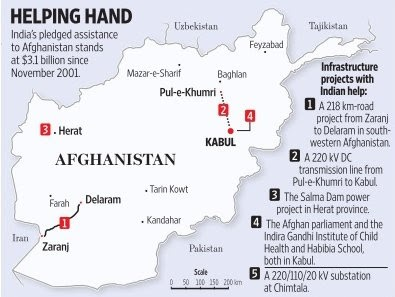International Relations
Road Ahead for Afghanistan after US Exit
- 05 Jul 2021
- 6 min read
Why in News
Recently, the US troops departed from the biggest airbase in Afghanistan after the 20-year-long war, effectively ending their military operations in the country.
Key Points
- Background:
- On 11th September 2001, terrorist attacks in America killed nearly 3,000 people.
- Osama Bin Laden, the head of Islamist terror group al-Qaeda, was quickly identified as the man responsible.
- The Taliban, radical Islamists who ran Afghanistan at that time, protected Bin Laden, and refused to hand him over. So, a month after 9/11, the US launched airstrikes against Afghanistan (Operation Enduring Freedom).
- After the attacks, the NATO coalition troops declared war on Afghanistan.
- The US dislodged the Taliban regime and established a transitional government in Afghanistan.
- On 11th September 2001, terrorist attacks in America killed nearly 3,000 people.
- Reason for US Pull Back:
- The US had reached the conclusion long ago that the war was unwinnable.
- The US administration had sent a representative to the first-ever meeting between the Taliban and the Afghan government that was hosted by Pakistan in Murree in 2015.
- However, the Murree talks did not progress.
- Doha Talk: The US appointed a special envoy for Afghanistan with a mandate to directly negotiate with the Taliban. They held talks with Taliban representatives in Doha that led to the February 2020 agreement between the US and the insurgents.
- Before the Doha talks started, the Taliban had maintained that they would hold direct talks only with the US, and not with the Kabul government, which they did not recognise.
- The US effectively accepted this demand when they cut the Afghan government off the process and entered direct talks with the insurgents.
- Terms of Agreement between the US and the Taliban:
- It dealt with four aspects of the conflict — violence, foreign troops, intra-Afghan peace talks and the use of Afghan soil by terrorist groups such as al-Qaeda and the Islamic State (the IS has an Afghan unit).
- In the agreement, the US administration promised that it would withdraw all American troops from Afghanistan by 1st May, 2021.
- The deadline has been pushed to 11th September 2021.
- The Taliban promised to reduce violence, join intra-Afghan peace talks and cut all ties with foreign terrorist groups.
- India’s reach out to the Taliban:

- India made contacts with the Taliban in Doha.
- This signals a late but realist acknowledgement from the Indian side that the Taliban would play a critical role in Afghanistan in the coming years.
- India has three critical areas in dealing with the Taliban.
- Protecting its investments, which run into billions of rupees, in Afghanistan;
- Preventing a future Taliban regime from being a pawn of Pakistan;
- Making sure that the Pakistan-backed anti-India terrorist groups do not get support from the Taliban.
- In the past, India chose not to engage the Taliban (New Delhi had backed the Northern Alliance) and the costs were dear when the Taliban was in power.
- In November 2001, the Northern Alliance took control of the Afghanistan capital Kabul. The Northern Alliance fought a defensive war against the Taliban government and were being helped by the US and other countries that agreed with it, including the UK.
- India made contacts with the Taliban in Doha.
- Possible Scenarios for Afghanistan:
- The American withdrawal has turned the balance of power in the battleground in favour of the Taliban.
- They are already making rapid advances, and could launch a major offensive targeting the city centres and provincial capitals once the Americans are out.
- There could be three scenarios:
- There could be a political settlement in which the Taliban and the government agree to some power-sharing mechanism and jointly shape the future of Afghanistan. As of now, this looks like a remote possibility.
- An all-out civil war may be possible, in which the government, economically backed and militarily trained by the West, holds on to its positions in key cities and the Taliban expand its reach in the countryside, while other ethnic militias fight for their fiefs. This is already unfolding.
- The Taliban taking over the country.
Conclusion
- After the agreement was signed, the US put pressure on the Afghan government to release thousands of Taliban prisoners.
- A key Taliban precondition for starting intra-Afghan talks.
- Talks between Taliban representatives and the Afghan government began in Doha in September 2020 but did not reach any breakthrough. At present, the peace process is frozen.
- The Taliban reduced hostilities against foreign troops but continued to attack Afghan forces even after the agreement was signed.
- Kabul maintains that the Pakistan support for the Taliban is allowing the insurgents to overcome military pressure and carry forward with their agenda.




